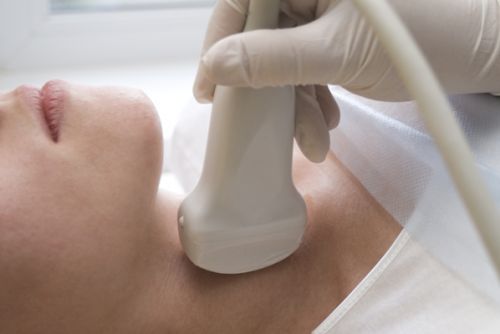The thyroid gland
|
The thyroid gland is practically a hormone factory in the throat. This small gland secretes the thyroid hormones T4 and T3 into the circulation, which influence numerous metabolic processes in our bodies: disorders in the thyroid function can lead to an irregular monthly cycle, reduced fertility, increased abortion risk and impaired mental and physical development of the fetuses. Different diseases can lead to hyper/hypo activity of the thyroid gland. |
 |
The thyroid gland is controlled by the hormone TSH (thyroid stimulating hormone), which is secreted by the pituitary gland into the blood. At the first sign of a hypoactivity, the levels of TSH increase, and conversely, they decrease at the onset of hyperactivity.
The function of the thyroid gland is monitored by the levels of TSH and free thyroid hormones. Additionally, a TRH analysis can be performed: after determining of the basal TSH level, the pituitary is stimulated by an injection or a nasal spray. Afterwards, the levels of stimulated TSH are measured.
In order to diagnose an underlying disease, further tests are usually needed (estimation of the thyroid gland antibodies, ultrasound, etc.)
The thyroid gland and conception
Women in childbearing age should have TSH levels under 2.5 µU/ml, so that in case of a possible pregnancy, the supply of thyroid hormones to the embryo is ensured within first several weeks. Women having problems conceiving should strive for low TSH levels. In this case, a TRH test can be helpful; the TSH level after the stimulation should be lower than 20 µU/ml.
The first sign of a thyroid gland hyperactivity is a lowered TSH level in the blood. At TSH levels lower than 0.4 µU/ml (which are not caused by an ongoing thyroid hormone therapy), further examination of the thyroid gland is absolutely necessary.
>Usually, we advise our patients to make a comprehensive thyroid gland examination in the following cases:
- Previous tests show multiple instances of TSH > 2.0 µU/ml, or an increase in the TRH test greater than 20 µl/ml
- Elevated levels of thyroid gland antibodies
- Current or previous thyroid gland disease resp. operation
- Condition after taking thyroid gland medicines
- Type 1 diabetes or other autoimmune diseases/li>
- The individual had irradiation of the head or the neck
- The individual had multiple abortions
Thyroid hormone therapy>
- Thyroid hormone pills should be taken in the mornings, while sober, and at least 30 minutes before breakfast.
- >At least six weeks are needed, before the regulation cycle between thyroid gland and the TSH levels is set. The TSH levels are only reliable after the thyroid hormone pills have been taken for at least weeks with constant dosage.
- f a pregnancy occurs, reception of the thyroid hormone pills must absolutely continue. The dosage must be controlled regularly. The first control of the thyroid gland function has to be performed not later than the 8th pregnancy week.
The thyroid gland and pregnancy
Different factors influence functioning of the thyroid gland after pregnancy has begun: the pregnancy hormone Beta-HCG has effect on the maternal thyroid gland as well. Therefore, borderline thyroid hyperactivity ensues in the early pregnancy (most pronounced in the 10th pregnancy week). If this continues, the probability of an abortion increases. In the case of intake of thyroid hormone pills, many patients need increased doses in the first third of the pregnancy.
To our patients with thyroid gland disorders, we recommend a control of the thyroid gland functions around the 8th pregnancy week (TSH, free T4). The intervals for further controls are set accordingly to the individual results.
To all our patients without known thyroid gland disorders, we recommend control of the thyroid gland functions around the 10th pregnancy week. (TSH, TPO-antibodies). In the following case, no further controls of the thyroid gland during the pregnancy are necessary: TSH 0.2-0.5 µU/ml and TPO antibodies negative. Otherwise, we recommend further thyroid gland testing during the pregnancy.
The thyroid gland after birth
In the frame of hormonal adjustments after the birth, measurable thyroid gland hyperactivity can occur, which in the course of several weeks or months transforms into treatment-requiring hypoactivity. To our patients with thyroid gland diseases, we recommend a control of the TSH level three and six months after giving birth, resp. as recommended by your treating thyroid gland specialist.


